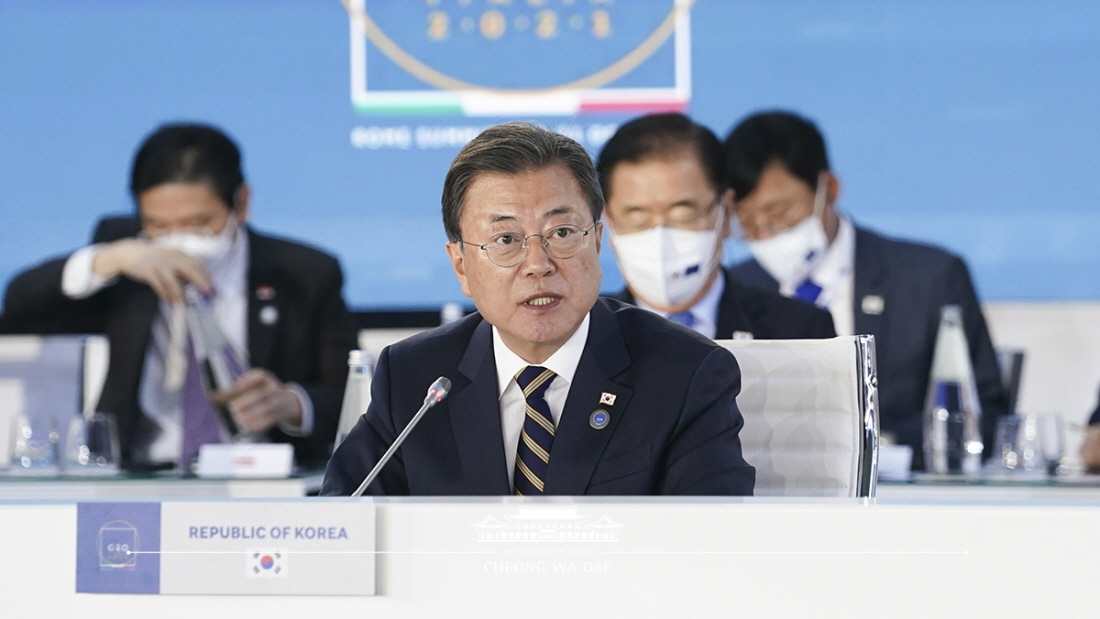이 웹사이트는 제19대 대통령 임기 종료에 따라 대통령기록관이 「대통령기록물 관리에 관한 법률」에 의해 이관받아 서비스하는 대통령기록물입니다. 자료의 열람만 가능하며 수정 · 추가 · 삭제는 불가능합니다.
다만, 「개인정보보호법」에 의하여 개인의 정보를 보호받기 원하시는 분은 관련 내용(요청자, 요청내용, 연락처, 글위치)을 대통령 웹기록물 담당자(044-211-2253)에게 요청해 주시면 신속히 검토하여 조치해 드리겠습니다. 감사합니다.
SPEECHES & REMARKS
BRIEFINGS

Honorable President Biden, Excellencies,
With the time approaching for us to return to normal life, consumption and demand for investments that have been repressed by the COVID-19 pandemic are rebounding rapidly.
However, global supply chains have still recovered only half of their full capacity. Production and logistics disruptions in many parts of the world have delayed a supply-side recovery. The imbalance between demand and supply has also increased inflationary pressures.
Stable global supply chains are urgently needed for a full-fledged economic recovery.
It is meaningful for world leaders to come together today and discuss how to restore supply chains. I’d like to express my respect to President Biden for his leadership.
Excellencies,
The world economy is closely interconnected by a single chain through global supply networks. Until all countries’ economic activities are put back on the right track, global supply chain instabilities are bound to persist.
An open and fair trade order must be reinstated so that businesses can establish more close-knit supply chains through free trade and investment.
First of all, we will have to jointly respond to the global logistics crisis. With logistics disruptions recently becoming more serious, they are emerging as the biggest factor destabilizing the global economy. Ships that have not been able to unload containers due to a shortage of workers are lined up at numerous ports, and record-high shipping rates are fueling inflation, including global prices for raw materials.
Korea is urgently responding to this logistics emergency by deploying temporary ships and planes as well as by supplying new containers. The cargo handling space in the Port of Busan, the world’s seventh largest container port, has been enlarged as much as it can be, and we are building joint logistics centers in such global ports as Rotterdam, Barcelona and Java.
However, supply chains and logistics are matters of interconnection and flow, and thus, related tasks are difficult for a single country to address through its own capabilities alone. First of all, we need to speed up the logistics flow within each country by mobilizing all possible emergency measures.
In addition to airports and ports, we should maximize the operation of land logistics networks like railways and roads, related personnel, and containers. Also, when it comes to vaccination and epidemic prevention and control, managing logistics hubs should be the top priority.
Moreover, the international community and business leaders will have to find common response plans, such as preparing alternative transport means and adjusting transportation schedules. To prevent future logistics disruptions in advance, I hope that the logistics management system – from transportation to customs clearance and retail distribution – will be digitalized and the related data and information freely shared.
We have been searching for solutions to the myriad of problems triggered by COVID-19 through solidarity, cooperation and multilateralism. I hope that today’s summit will also serve as an opportunity to gather wisdom for restoring supply chains and accelerate a complete global economic recovery.
Thank you.



